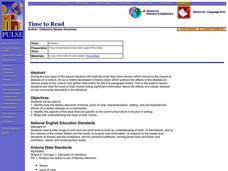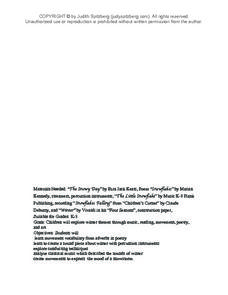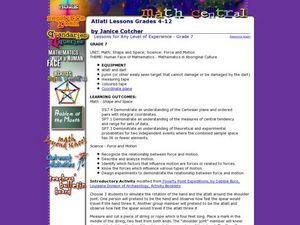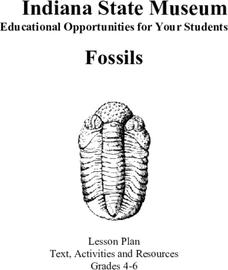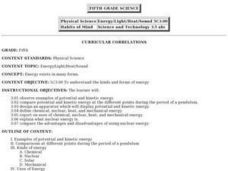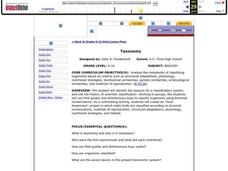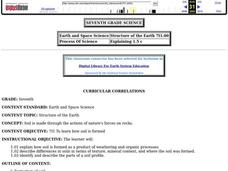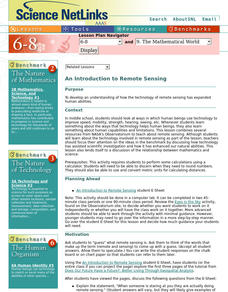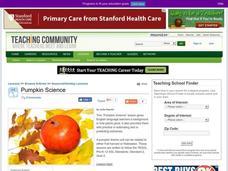Roald Dahl
Roald Dahl Matilda Lesson Plans
Fifty eye-catching pages contain six lessons about Roald Dahl's novel, Matilda. Each lesson has a theme and covers a different subject—literacy, social-emotional learning, science, and geography. Scholars analyze characters, examine...
Curated OER
Common Themes
Tenth graders test usefulness of a model Earth by comparing its predictions to observations in the real world. In this landforms lesson students construct an island from a contour map using model clay then analyze the landscape...
Curated OER
Time to Read
High schoolers identify how the literary elements of theme, point of view, characterization, setting, and plot illustrate the effects of a certain disease on a community. They identify the aspects of the book that are specific to the...
Curated OER
Winter Through the Arts
Students read the book The Snowy Day and discover various winter themes. In this winter lesson plan, students develop movements to express the feeling of a snowstorm. Students also construct winter-themed art pieces.
Discovery Education
Mood Music!
Grouchy? Sad? Here's a great resource that shows kids how music can be used to lift their spirits. Kids collect and chart data on the effects of music on emotions. After analyzing the results of their experiment, they develop...
Curated OER
Fossil Fuels (Part III), The Geology of Coal
Do not overlook this set of lessons just because your school does not have a data analysis system. There is plenty of material here to administer a complete mini unit on the formation, distribution, and properties of coal. Since it...
National Geographic
The Monsoon
Few things are as fascinating as the challenge of climbing Mount Everest. This lesson investigates how monsoon weather impacts climbers. To begin, you are instructed to show various video clips. The only one directly provided, however,...
Curated OER
Literature of the Islands and the Sea
Students read an age-appropriate novel in which an island setting plays an important role from a provided list. This will help them understand life on an island. They will analyze the plot, theme, characterization, setting, and style...
National Geographic
Altitude: What's in the Air?
Introuduce your scientists to the differences in air at varying altitudes with a colorful explanatory graph. After some discussion, they view unbelievable footage of mountain-climbing Leo Houlding and a narrative about how he might do...
Curated OER
Creating Artwork to Explain Environmental Change
Students review artwork that relates to the environment and communicates a value. They view and analyze art by Andy Warhol, Eric Carle and Albert Bierstadt and then create original pieces with an environmental theme.
Curated OER
Reduce, Reuse, Recycle
Young scholars understand the process of recycling. They investigate how it improves the environment. They read the story "Don't Pollute" by Stan and Jan Berenstein. They analyze trash and sort it into bins.
Curated OER
Atlatl Lessons for Grade 7
Seventh graders examine force and motion. In this seventh grade mathematics/science lesson plan, 7th graders collect and analyze data regarding the use of an atlatl to throw a spear. Students describe and analyze the motion which leads...
Curated OER
Fossils
Students complete a unit on fossils. They read and discuss informational handouts, define key vocabulary terms, answer discussion questions, create a geologic timeline and a timeline of their own life, analyze bones, and create a fossil...
Curated OER
Energy, Light, Heat, and Sound
Fifth graders investigate various forms of energy. They compare potential and kinetic energy at different points during the period of a pendulum, design an apparatus that displays potential and kinetic energy, and analyze the advantages...
New York State Education Department
TASC Transition Curriculum: Workshop 3
Teachers turning into learners? It's not Freaky Friday! It's a thoughtful workshop that teaches participants how to plan professional development for staff. Third in a 15-part series, the workshop provides a platform for the other...
Curated OER
Life's Lessons: Survival of the Fittest
Students analyze Jack London's use of anthropomorphism to identify the importance of adaptability in life. In this literature lesson, students use the novel The Call of the Wild to identify key elements in survival. Students...
Curated OER
From Seeds to Plants
Second graders review the process of plant reproduction and the role of seeds in that process. The students dissect a seed, analyze their finds, collect and record data, and make predictions about seed germination and plant growth.
Curated OER
Taxonomy
Students analyze the complexity of organism classifications based on certain criteria. In this classifying organisms activity students study taxonomy and gather information and leaves to do their own experiment on...
Curated OER
Wind Power: From Eyesore to Energy
Students design their own wind turbine according to client's needs. For this science and technology lesson, students analyze the pros and cons of using wind power. They construct a model of their proposed wind turbine and present it to...
Curated OER
Earth's History
Sixth graders investigate how fossils are formed. They analyze a photo of the Grand Canyon, and create a fossil cast and mold using plaster of paris and shells.
Curated OER
Soil Formation
Seventh graders investigate how soil is formed. They analyze types of soil samples, examine soil using a magnifying glass or microscope, complete a chart, conduct a soil and plant experiment, and construct a soil profile.
Curated OER
Sampling Rocks
Students study rocks they find on the playground. In this investigative lesson students collect and analyze rocks they find and answer questions about them.
Curated OER
Pumpkin Science
Young scholars investigate how plants grow by analyzing pumpkins. In this agricultural lesson, students read The Biggest Pumpkin Ever by Steven Kroll, and draw pictures of a pumpkin in each of its growing stages. Young scholars measure...
Curated OER
Silent Spring
Students read background information about Rachel Carson found on the listed website links. They analyze and answer questions about her work and how it is linked to science then they research pesticide usage and alternative methods.


